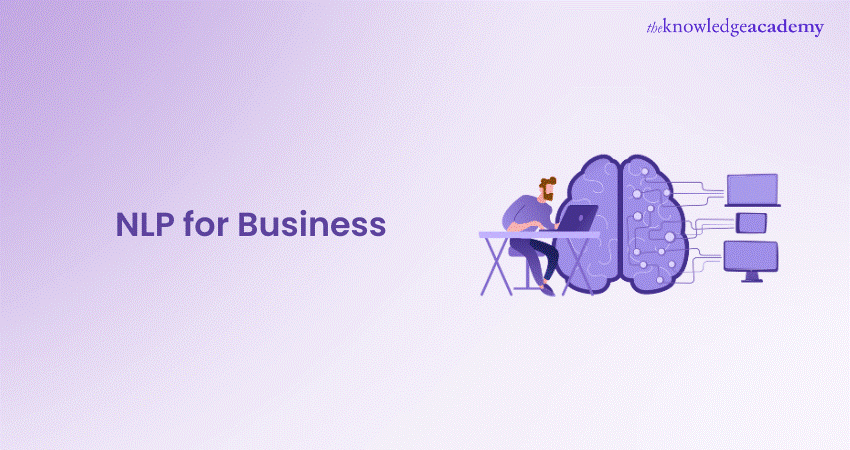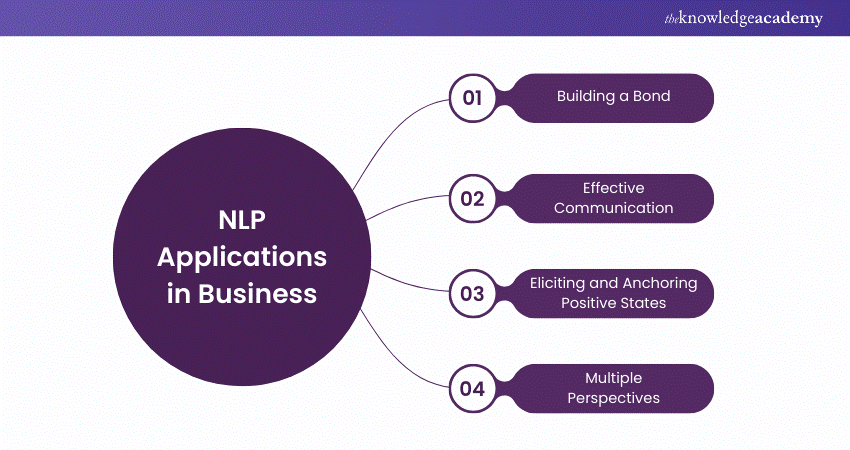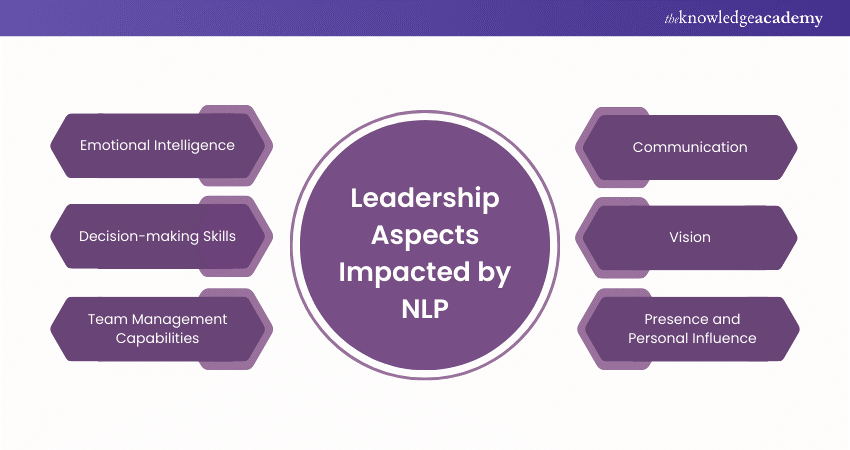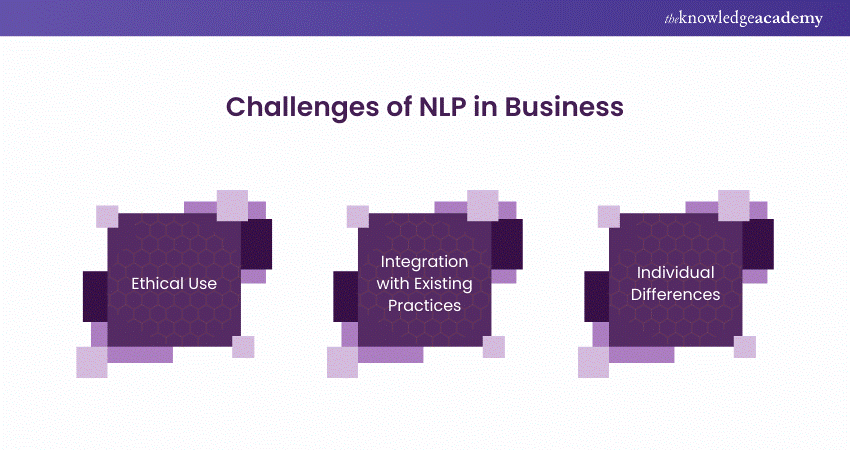We may not have the course you’re looking for. If you enquire or give us a call on +1800812339 and speak to our training experts, we may still be able to help with your training requirements.
We ensure quality, budget-alignment, and timely delivery by our expert instructors.

A business is a complex amalgamation of minds unified by the singular goal of long-term success. But what if you could unlock the secrets of the human mind and the behaviour it drives to boost your business' success? That’s precisely the power wielded by NLP for business! Neuro-Linguistic Programming (NLP) has emerged as a groundbreaking methodology encompassing psychological techniques, linguistic patterns, and personal development strategies to unleash the full potential of individuals and teams.
NLP is built upon the idea that words and thinking patterns can drive and change an individual's behaviour and perceptions, which is vastly relevant in business. With NLP, companies can decode the language of the mind, leading to more effective strategies and stronger connections. This blog delves deep into the applications of NLP for Business and illuminates how it is revolutionising the way businesses operate, one insightful interaction at a time.
Table of Contents
1) What is the Significance of NLP in Business?
2) NLP Business Applications
a) Building a Bond
b) Effective Communication
c) Eliciting and Anchoring Positive States
d) Multiple Perspectives
3) Challenges of Incorporating NLP in Business
4) Conclusion
What is the Significance of NLP in Business?
In the business world, effective communication lies at the heart of successful collaboration, negotiation, and customer relationships. By leveraging NLP principles and techniques, businesses can create a positive and productive work environment where ideas flow freely, conflicts are resolved efficiently, and relationships are strengthened.
NLP also offers valuable insights into influential and persuasive communication strategies. In marketing, sales, and negotiations, understanding the principles of NLP can significantly impact success. By utilising language patterns, non-verbal cues, and techniques such as mirroring and pacing, professionals can effectively influence and motivate others, leading to improved sales conversions, successful negotiations, and beneficial collaborations.
NLP Business Applications
NLP can enhance various aspects of a business, from developing rapport with leadership and management. Here are some of the significant NLP Business applications:

a) Building a Bond
Businesses thrive on the satisfaction of their customers, which is why it is essential to forge meaningful connections with them and make them feel valued while providing results aligned with their interests. When you bond with your customers, you better understand their interests and expectations.
By understanding and utilising NLP strategies such as mirroring and matching, professionals can establish rapport quickly, build trust, and create a harmonious and collaborative work environment. They help businesses understand the customers' preferences, interact with them based on their interests, and develop a positive relationship with them.
b) Effective Communication
Clear communication is indispensable for successful businesses as it builds positive and fruitful connections with key players in the field, like stakeholders, clients, etc. It fosters better collaboration, enhances teamwork, and strengthens relationships with them.
NLP reveals essential information about language patterns and their influence on communication. By understanding and utilising language patterns such as embedded commands, active listening, emotional anchoring, and sensory language, professionals can enhance their ability to convey ideas effectively and influence others positively in a business.
NLP techniques also involve paying attention to non-verbal cues, such as body language and tone of voice, to ensure alignment between verbal and non-verbal communication. Incorporating these into business promotes trust and collaboration between all parties.
Acquire and enhance your communication skills with our NLP Courses now!
c) Eliciting and Anchoring Positive States
Imagine calling upon your highest level of motivation and focusing it exactly where you want it? This is where NLP can serve you well. NLP has techniques for eliciting any positive state of mind you have experienced and applying it wherever you find helpful. For example, in NLP sales training, significant boosts in phone sales have been achieved by linking the expectation of success to the act of answering the phone.
The most effective business persuasion operates on two parallel tracks:
1) Providing people with logical reasons to support their purchase decisions and influencing them to act.
2) Recognising that these decisions are often made based on emotions.
Therefore, a business owner can benefit from evoking a strong, positive emotional state and anchoring it to a shared vision of the enriched life the product or service will bring. This emotional connection is what truly engages and connects with the audience.
d) Multiple Perspectives
In NLP, we discuss first, second, third and fourth positions as four different ways to perceive a situation. These four positions are discussed below:
1) The first position is to see things from a service representative's perspective when assisting a customer.
2) The second position, a perspective of empathy, is about seeing things from the customer's point of view in the same situation. This understanding of what a customer feels fosters a deeper connection and is a cornerstone of customer-oriented businesses.
3) The third position, a detached viewpoint, involves taking in the situation as an uninvolved third party, watching from a distance. This detachment allows for a more objective observation, where the interplay can be better understood.
4) The fourth position is the Systems View, which steps back to a different way of assessing the dynamics as a system. It uses Systems Thinking tools to map feedback loops and better understand system dynamics.
Seeing things from the customer's point of view, as well as from the perspectives of the detached observer and systems view brings new information that helps build rapport and understanding. Switching positions is also a useful skill for negotiating and resolving conflict.
Looking for new ways to elevate business success? Try our NLP Foundation Course. Sign up now!
Leadership and Management

One of the most significant NLP Business applications is reflected in leadership and management. Leadership effectiveness is closely tied to effective communication and self-awareness. NLP offers valuable tools and techniques for leaders to enhance various aspects of themselves, such as:
a) Emotional Intelligence: Gaining better control over your emotions, especially in a professional environment, results from self-awareness. NLP techniques help business leaders gain insights into their beliefs, values, and behaviours, enabling them to understand their strengths and weaknesses. This gives leaders more control over their emotions and their team members.
b) Decision-making Skills: NLP offers techniques for enhancing decision-making skills and setting compelling goals. Leaders can make informed and strategic decisions using NLP strategies such as outcome thinking, timeline techniques, and sub-modalities.
c) Team Management Capabilities: NLP provides strategies for effective team management. By understanding different communication styles and preferences, leaders can adapt their communication approaches to connect with each team member of a business effectively.
d) Communication: NLP techniques are crucial in improving communication skills essential for effective leadership. With the help of NLP strategies such as rapport-building, active listening, and precise language patterns, leaders can establish open lines of communication with their team members.
Businesses function more efficiently when team leaders and managers use NLP techniques to improve themselves. Organisations flourish with influential leaders who can develop a healthy, positive, and inspiring work culture.
e) Vision: Mastering the art of using language that has universal appeal inspires stakeholders to actively participate in achieving collective success. NLP practitioners use language models that recognise the impact of phrase structures and words on both conscious and unconscious levels.
f) Presence and Personal Influence: An effective way of creating more authentic conversations involves using powerful state management techniques that enhances interpersonal impact when coaching, leading, presenting, negotiating, and facilitating. Perceived status can either help or inhibit connection and engagement. NLP techniques provide insights on developing flexibility in this aspect, allowing for more meaningful interactions.
Persuasion
Persuasion in the context of business deals means to skilfully influence and motivate others to take a desired course of action. It is a crucial aspect of business success, and NLP offers valuable techniques to enhance your persuasive abilities. Here are some of how NLP helps in improving one's persuasion skills:
a) Mirroring Communication Patterns: Copying a person's communication style or pattern is the most effective way to establish a connection with them and increase the likelihood of influencing their decisions. Individuals can influence or persuade others by studying language patterns and recognising the impact of words, tone, and non-verbal cues.
b) Embedded Commands: Embedded commands refer to subtle suggestions inserted in a conversation. It is an NLP technique, one of the most effective ways to influence or persuade people in the business world into doing something.
For instance, if you visit the cosmetic section of a store, a well-trained staff will ask, "Which product would you like to try first?" instead of "Do you want to try something?". The former dialogue is more effective as it is polite but also sounds like a command, which weakens one's will to say no.
c) Framing and Reframing: Framing involves presenting information that highlights its positive aspects or benefits, while reframing involves shifting the perspective or context of a situation to change its meaning. By using NLP techniques to frame messages and reframe objections or challenges, professionals in the business can shape the interpretation of information and influence how others perceive it.
Learn more about Neuro-Linguistic Programming by signing up for our Neuro Linguistic Programming Course now!
Challenges of incorporating NLP in business

Although NLP Business strategies improve business outcomes, certain challenges or concerns must be considered. Here are some of the significant concerns of incorporating NLP in businesses:
a) Ethical Use: While NLP techniques can be powerful, using them ethically and responsibly is essential. The impact of NLP techniques, like persuasive techniques, on individuals must be considered. It must also be ensured that they are not manipulated or coerced.
b) Individual Differences: NLP is not the rule book but a toolkit simplifying business processes. Since individuals have different preferences, values, and learning styles, it is vital to adapt NLP strategies to suit the specific needs and characteristics of that particular person.
c) Integration with Existing Practices: NLP should be integrated thoughtfully with existing business practices and frameworks. Assessing the compatibility and alignment of NLP principles with organisational values, strategies, and goals is essential.
Conclusion
In conclusion, NLP for Business revolutionises how companies interact, innovate, and grow. By integrating NLP into business strategies, organisations can enhance communication, improve leadership, and streamline operations. We hope this blog helps you expand the horizons of your business and encourage you to leverage NLP techniques to achieve excellence in the competitive corporate landscape.
Improve your understanding of NLP and excel in your profession with our NLP Foundation And Practitioner Training course now!
Frequently Asked Questions
In What Ways can NLP Boost Employee Productivity in the Workplace?

NLP helps individuals improve in their job roles by using the work ethic and behaviour of a highly performing team member as a model for others to emulate. You could have a team as strong as your most robust employee. This would significantly impact productivity and give your business a competitive edge.
Can NLP be Utilised for Strategic Planning and Goal Setting in Business?

Yes, NLP models help align business activity with organisational goals, provide frameworks for managing performance, and positively influence group and individual motivation.Yes. NLP models help align business activity with organisational goals, provide frameworks for managing performance, and positively influence group and individual motivation.
What are the Other Resources and Offers Provided by The Knowledge Academy?

The Knowledge Academy takes global learning to new heights, offering over 3,000 online courses across 490+ locations in 190+ countries. This expansive reach ensures accessibility and convenience for learners worldwide.
Alongside our diverse Online Course Catalogue, encompassing 19 major categories, we go the extra mile by providing a plethora of free educational Online Resources like News updates, Blogs, videos, webinars, and interview questions. Tailoring learning experiences further, professionals can maximise value with customisable Course Bundles of TKA.
What is The Knowledge Pass, and How Does it Work?

The Knowledge Academy’s Knowledge Pass, a prepaid voucher, adds another layer of flexibility, allowing course bookings over a 12-month period. Join us on a journey where education knows no bounds.
What are the Related Courses and Blogs Provided by The Knowledge Academy?

The Knowledge Academy offers various NLP Courses, including the Master Diploma in NLP Course and the NLP Master Practitioner Course. These courses cater to different skill levels, providing comprehensive insights into Neuro-linguistic Programming (NLP).
Our Business Skills Blogs cover a range of topics related to NLP, offering valuable resources, best practices, and industry insights. Whether you are a beginner or looking to advance your NLP knowledge base, The Knowledge Academy's diverse courses and informative blogs have got you covered.
Upcoming Business Skills Resources Batches & Dates
Date
 Neuro Linguistic Programming
Neuro Linguistic Programming
Fri 11th Apr 2025
Fri 18th Jul 2025
Fri 21st Nov 2025






 Top Rated Course
Top Rated Course



 If you wish to make any changes to your course, please
If you wish to make any changes to your course, please


